Lawyers must negotiate a complex set of obligations when acting for clients, maintaining focus on money laundering, sanctions and ‘beneficial ownership’. Eduardo Reyes reports
At the table
(left, clockwise)
Eduardo Reyes, Law Society Gazette
Linda Felton, Fortune Green Legal Practice
Nicholas Woolf, Swan Turton
Claire Larbey, Trowers & Hamlin
Corinne Staves, CM Murray
Olly Thornton-Berry, Thirdfort
(Suzie Ogilvie, Freshfields Bruckhaus Deringer, Linda Kirk, Adkirk Law, Rachel Adamson, Adkirk Law on screen)
Allison Clare KC, Red Lion Chambers
Paul Bennett, Bennett Briegal
Suzanne Gill, Wedlake Bell
Peter Cadman, Russell-Cooke
Harriet Holmes, Thirdfort
Regulators, legislators and the media view lawyers with suspicion. Earlier this year, BBC Radio 4 aired a six-part series by journalist and author Oliver Bullough titled ‘How to steal a trillion’, which delves into Britain’s role in offshore money laundering. Law firms are alleged to play a vital role.
Lawyers are frequently labelled ‘professional enablers’ by government ministers and law enforcement agencies. Requirements over client due diligence are now shaped by anti-money laundering (AML) regulations, sanctions, and soon establishing the beneficial owners of corporate structures and property vehicles.
From sole practitioners to the self-styled global elite firms, key questions need to be answered at the outset: ‘Is my client who they say they are? And who really benefits from this matter?’
But are such requirements based on a misunderstanding of the role of lawyer? As Russell-Cooke’s Peter Cadman points out: ‘We, as solicitors, are all professional enablers. It’s what we do. I know [the phrase has] been taken over and has a bad connotation, but we are professionals, and we enable our clients, lawfully, to do what they want to do.’
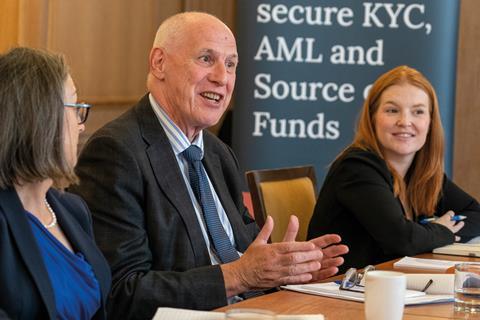
Client identification
'If your gut is giving you that warning, you have to then become really proactive in the checks that you do'
Paul Bennett, Bennett Briegal
Several attendees relate experiences of being presented with a client who, on closer inspection, was not the person they purported to be. These include clients with fake papers, and defendants in criminal cases who were not the real accused. Then there is the related problem of opaque corporate structures.
Adkirk Law’s Linda Kirk recalls a conveyancing transaction which she ‘just had a very bad feeling about’.
She adds: ‘At the time, I was just a solicitor in quite a large conveyancing department. I actually took it to the partner, and he said, “Send it to the money-laundering office, then”, so I did. They… passed it!’ Still dissatisfied, she rang the lender to check what identification the client had shown them, and what checks the bank had run. The passports shown to each did not match – and in fact one was forged. The client was an illegal immigrant, who was then arrested and deported. ‘Had I not gone with my gut feeling, that would’ve gone through,’ she reflects.
'You have to look carefully at the client profile... When we’re looking at what we’re taking on, we don’t actually just look at the document collection'
Suzie Ogilvie, Freshfields Bruckhaus Deringer
Compliance is no simple ‘box-ticking’ exercise, the attendees agree. In that context, a ‘gut feeling’ is an important line of defence. Paul Bennett, partner at Bennett Briegal, which advises professional services firms, explains: ‘You know your clients… you know who instructs you, you know what they instruct you for, you know why they instruct you.
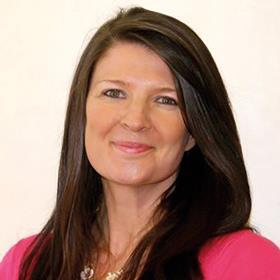
‘Whenever there’s something that comes up, where a transaction or a piece of litigation subsequently is shown to have a problem,’ he continues, ‘if you talk to the fee-earner… they always had that inclination, that spider sense [that] “something doesn’t feel quite right”. If your gut is giving you that warning, you have to then become really proactive in the checks that you do.’
‘You have to look carefully at the client profile,’ Freshfields Bruckhaus Deringer’s Suzie Ogilvie says. The firm’s clients are predominantly large corporates, and their ‘risk appetites’ relatively low. Clients at her firm are the subject of a ‘risk analysis’, she continues: ‘When we’re looking at what we’re taking on, we don’t actually just look at the document collection.’
Red flags flying: warning signs
Sometimes a client and their proposed transaction or case manages to tick the boxes on initial checks, and yet something does not ring true. Which ‘red flags’ demand closer attention?
- A suspicion a defendant client is not who they say they are
- A transaction’s lender has been provided with different identification documents to the law firm
- Unusual identification documents – like the ‘three-year driving licence’ in Dreamvar v Mishcon De Reya
- Client funds or fees arrive from a third party
- Examples of the client’s signature do not match
- The client resists attempts to meet, even via video link
- The commercial sense of a transaction does not ‘add up’
- The source for a very large transaction is ‘savings’
- A subsidiary entity, based abroad, is the party your client wants to be named in the contract
- Your law firm is asked to act on a matter in which it has no specialism
- Being approached by a new client whose matter is both ‘very urgent’ and ‘very simple’
- 'Mission creep', whereby the nature of a transaction is gradually changed
- A partner who ‘doesn’t like to push the client’ for information
- A gut instinct that something is wrong
Wider risks
'Experience helps solicitors to distinguish… between people who are naturally private and cautious about engaging in the process, and people who have something to hide'
Suzanne Gill, Wedlake Bell
On top of money laundering and sanctions checks, wider risks will be assessed, Ogilvie explains. These may encompass negative press coverage, political risk, ESG risk, ‘and other issues that may give rise to question marks’ over whether or not to act.
Ogilvie, Freshfields’ global head of financial crime and sanctions, is concerned that risk is seen too often in the context of regulatory compliance alone, leading lawyers to ask: ‘What do I need to do to comply?’ In that context, she says: ‘People can lose sight of the actual issue. I think that is one of the biggest challenges that we face.’
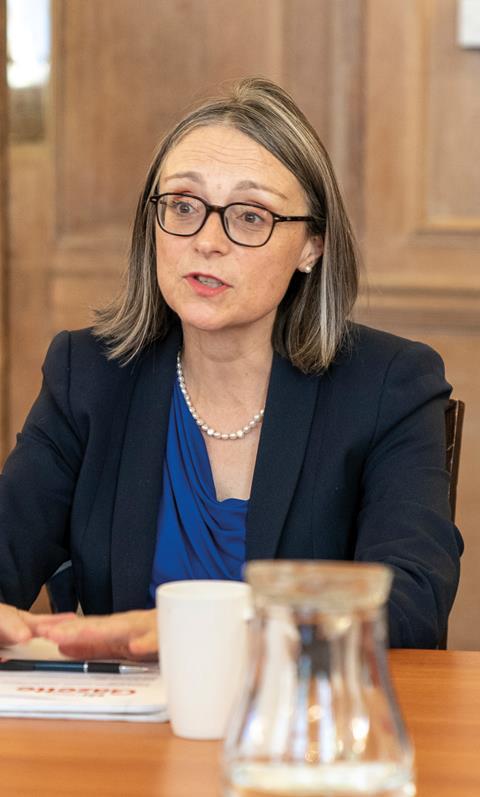
One risk that attendees note is that false comfort might be drawn from another firm’s verification checks – an issue that was at the heart of Dreamvar v Mishcon De Reya, where a property’s vendor was a fraudster. The Court of Appeal found that there had been a ‘breach of trust’ by both Mishcon (which acted for Dreamvar) and the vendor’s lawyers, Mary Monson Solicitors. The breach of trust would not have occurred if due diligence had been carried out properly.
There are particular challenges to building a general risk profile of some private clients, compared to corporate entities. Wedlake Bell partner Suzanne Gill explains: ‘Some very, very wealthy people deliberately have a very small online profile.’
Experience, Gill says, helps solicitors to ‘distinguish… between people who are naturally private and cautious about engaging in the process, and people who have something to hide’. But she still wants the extra assurance of systematic checks. Her firm uses Thirdfort, sponsor of this roundtable, which offers services including ID verification, AML compliance and source of funds checks. ‘That’s a huge comfort to me, to have the software to back me up,’ she says.
Thirdfort’s Harriet Holmes stresses the importance of risk and compliance training within firms, so that fee-earners ‘understand which bits compliance can do, which bits compliance can’t do, which bits technology can do for you and which bits technology can’t’.
Culture and training need to stress, she says, that everyone has responsibility for compliance: ‘If the ship sinks, you’re probably going to sink with the ship.’
She adds: ‘Technology is there to really support you. It’s there to collect information that you might not be able to access without that technology platform.’ But technology only offers limited protection where the ‘culture’ of a firm is flawed.
‘It’s not only your own clients,’ Trowers & Hamlin’s general counsel Claire Larbey notes. ‘We see counterparties that have been taken on by some very good law firms, where our partners have come to us and said, “We’re concerned about what’s going on in this transaction. It’s not adding up for us”.’
The response if the firm is not satisfied by further enquiries, she says, will be to pull the plug on the deal even though fees have been incurred. ‘We’re a very heavy real estate firm,’ she says, ‘so we see lots of those… instances… it is interesting how much of an increase there is out there on the other side.’
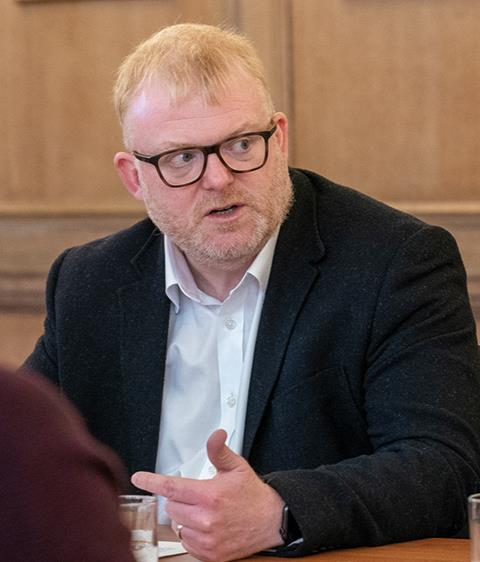
Bennett says he is sometimes called on to deliver advice that aligns with that already given by concerned colleagues of a powerful law firm partner. He describes the scenario of ‘medium-sized firms driven, particularly when they’ve gone through a high period of growth over 15 or 20 years, by the power of a small group of partners’. It is, he says, ‘very difficult to say no to those partners internally’, but the same partners will accept similar counsel when it is delivered as external advice.
Allison Clare KC warns of deals where the due diligence has been about ‘form over substance’, and where, typically, a subsidiary entity of a company is chosen to contract because it is more likely to pass any due diligence. In this scenario, due diligence of the foreign entity chosen to contract may be possible only to a lower standard. ‘That is a great example which I see a lot of,’ she says, in the context of disputes that follow transactions.
In smaller firms, which lack the compliance resource of larger practices, there are ‘red flags’ of which it is crucial to be aware, says Linda Felton of Fortune Green Legal Practice. One is being asked to act on a matter where the firm lacks expertise. Here a strong line is needed – it is important to say: ‘This is what the firm specialises in. We don’t go beyond that.’
Culture
‘What we need to really focus on as professional services advisers is ensuring that the culture of the firm and the leadership of the firm are correct,’ CM Murray partner Corrine Staves points out. ‘If you have the right culture and the right values, those partners understand it protects reputation and it’s for the good of the firm.’
‘Saying this is the responsibility of [the] compliance [department] is very often where things go wrong,’ Clare points out. ‘If there is actually something complicated happening, it’s only the business unit people who actually understand the transaction… to expect compliance to understand a complicated transaction in its commercial sense, is a bit naive.’
Nicholas Woolf, consultant at Swan Turton, points out the need for ongoing vigilance – of both a client and transactions. He uses the example of a client being asked for money, ‘and it’s third-party money that’s sent to you, which… can happen without you knowing’. There can also be a ‘change in the nature of a client’, he adds, which can happen even with continuing due diligence. Larbey notes that a change in the source of funds has become more common – and of course the response when that is noticed is to halt the transaction pending further due diligence. ‘It wasn’t happening a couple of years ago,’ she says, ‘and we have noticed more of a trend for that kind of thing to occur.’
‘Most decent firms,’ Gill says, are good at ‘doing a KYC [know your client] at the start… but the ongoing monitoring is definitely more of a challenge for law firms.’ That is easier to achieve where a firm has established a strong compliance culture. At her firm, Wedlake Bell, some of those accepting a training contract spend time as a paralegal in the compliance department before their training begins.
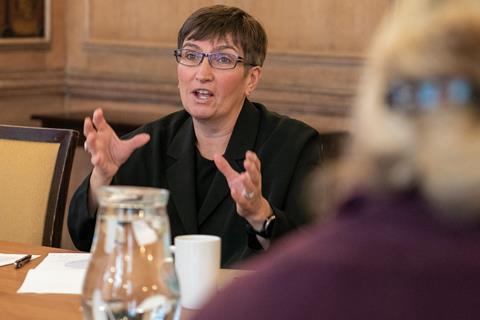
Beneficial ownership
The government’s response to criticism that illicit funds are laundered through the UK, or kept secure through the purchase of properties here, has been new rules on ‘beneficial ownership’ aimed at preventing the authentic ownership of property assets being concealed. This will take the form of a register of overseas entities.
The register is ‘looming very large on our screens’, Gill says. ‘One of the challenges is that when we accept clients, we take a risk-based approach,’ she explains. ‘When the client or the counter-party, your landlord or your seller, needs to go on the register of overseas entities at Companies House, there is no risk-based approach.’
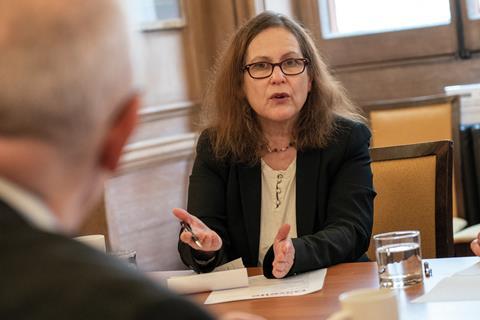
She gives an example of how a risk-based approach has worked in the past: ‘If we’re acting for somebody and the beneficial ownership is administered by a professional trustee organisation in Jersey and we know the Jersey trustee organisation, we’ve dealt with them before, we believe they are reputable, [then] they might say to us, “We don’t want to give you the whole trust deed but we will give you an extract of it”. As a risk-based analysis, we could say, “On this deal, from you, that’s fine.” And that allowed us to accept the client.’
Staves has an eye on the Economic Crime and Corporate Transparency Bill, which will usher in reforms to Companies House. She fears that without proper resources for the agency, new requirements intended to allow identity verification for directors and cross-checking of data will not provide the reassurance promised. Instead, compliance and the due diligence based on it will become another ‘tick-box’ exercise.
Ogilvie notes that there has been a continued focus on whether Companies House has the resources needed and whether that will be addressed. That is a concern she adds, because professionals who conduct the identity verification may be anxious of blame in the event of a failure.
War in Ukraine has also led to a rapidly developing sanctions list, and attendees report instances of firms having to second guess whether clients or prospective clients may be sanctioned in future. With some law firms being ‘named and shamed’ in parliament, based on who their clients are, firms are having to make decisions based on how a client might affect the firm’s reputation.
This is a new aspect of due diligence, Bennett notes, adding: ‘We’re not being asked to make ethical decisions, we’re being asked to make moral decisions and there’s a real difference, because… we’re making a judgement about who we will act for and who we won’t act for.’
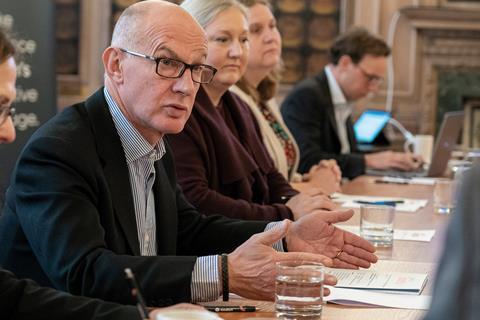
- This roundtable was kindly sponsored by Thirdfort
Photographs by Noah Da Costa























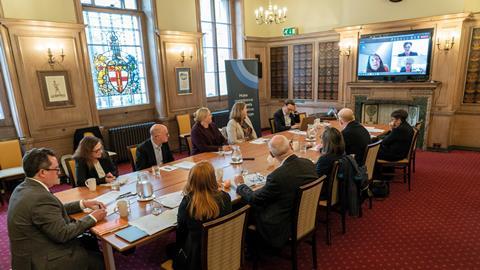








2 Readers' comments